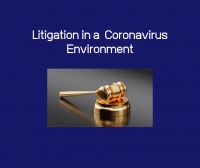The Coronavirus outbreak has impacted almost every part of daily life for individuals, families and businesses. AMM attorneys are monitoring legislative developments on the local, state and federal level as we continue to provide legal services.
We plan to provide summaries, analysis and legislative updates regularly on topics related to this crisis in order to assist our business and individual clients to stay abreast of changes and events in the rapidly changing legal landscape. All such content is available on our Coronavirus Blog page. Please reach out to one of our attorneys should you need advice or have questions.
As most of you know, last night the U.S. Senate passed the “Coronavirus Aid, Relief and Economic Security Act”, being referred to as the CARES Act, which is now being sent to the House of Representatives for a final vote. It is expected that the House will pass the measure without further changes, and that it will be signed into law by the President. More details will be provided as we move along, but broadly speaking the CARES Act provides the following benefits and stimulus to U.S. small businesses and individuals:
On March 24, 2020, the United States Department of Labor ("DOL") issued limited guidance regarding the Families First Coronvirus Response Act (the “Act”).
Most importantly, the DOL identified April 1, 2020 as the Effective Date of the Act, contrary to the conclusion of most observers that the Act would go into effect on April 2, 2020. Accordingly, employers of all sizes should plan to come into compliance on April 1, 2020. The DOL also clarified that the Act is not retroactive. The DOL also advises not to send requests for the small business exemption to the department, and that it will issue regulations regarding the small business exemption at a later date.
With individuals residing in Allegheny County, Bucks County, Chester County, Delaware County, Monroe County, Montgomery County, and Philadelphia County ordered to stay at home with only certain limited exceptions, and non-life sustaining businesses ordered to close, business owners struggle with what to do next. The full text of the Governor’s order and other related information can be found here. While there are many unanswered questions and additional guidance is continually being issued, business owners do have resources available to them.
In the course of the past few days, we have all been presented with unforeseen challenges as a result of the COVID-19 virus. If you currently have a custody order in place or are going through a custody battle, you might be experiencing parenting issues stemming from the coronavirus outbreak, the recent school closures and work from home mandates.
Business interruption insurance covers a business’ losses resulting from a direct physical loss or damage to property. Accordingly, coverage under such a policy generally will not trigger unless there is a direct physical loss to the business’s property. In some circumstances, loss of income due to a disaster-related closing of a business’ physical location is covered.
The coronavirus pandemic has already caused massive financial impacts across nearly every industry in the Commonwealth of Pennsylvania. Unemployment claims have skyrocketed, essentially all physical business locations are closed, and industry is struggling to convert to remote operations. Unfortunately, it appears the financial crisis is just beginning.
On Friday, March 20, 2020, Treasury Secretary Mnuchin stated, via Twitter, that the federal government is “moving Tax Day from April 15 to July 15,” and that “all taxpayers and businesses will have this additional time to file and make payments without interest or penalties.” Though the U.S. Treasury and Internal Revenue Service have not yet issued any official written pronouncements, Secretary Mnuchin indicated that he was tweeting at the direction of President Trump.
Pennsylvania Business owners have probably heard that Governor Tom Wolf ordered that all "non-life-sustaining" businesses in Pennsylvania must close their physical locations to slow the spread of COVID-19. This order went into effect last evening. You may be wondering whether your business is “life-sustaining” and may stay open. There is little guidance from the Governor’s office, other than the chart published by the Governor.
As the coronavirus pandemic extends its grip across the Commonwealth of Pennsylvania, its effects are felt throughout the practice of law. The very nature of litigation, the need for witness testimony, advocacy and argument before a tribunal, judge or jury necessarily implicates close personal contact. While measures to preserve the status quo are certainly necessary, the impact on pending litigation as well as potential new litigation, is developing.








